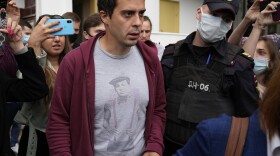DAVID GREENE, HOST:
Russia is stepping in to try and stop a war between two former Soviet republics near its southern border. For the past month, Armenia and Azerbaijan have been fighting over a tiny mountainous region called Nagorno-Karabakh. It's within the borders of Azerbaijan, but the population is predominantly Armenian. The implications of this fight reach far beyond those two small countries.
And let's bring in NPR's Lucian Kim from Moscow. Lucian, good morning.
LUCIAN KIM, BYLINE: Good morning.
GREENE: So we've seen three cease-fires over the past month or so. They almost - they all failed almost immediately. What is this agreement that's being brokered by the Russians here?
KIM: Well, this agreement calls for the immediate cessation of hostilities. And unlike those previous cease-fires you mentioned, it looks like it's sticking. The main reason for that is that Azerbaijan has taken a key town in Nagorno-Karabakh that cuts the region's main supply line to Armenia. So Armenia really was in no position to resist this agreement. Russian President Vladimir Putin went on TV in the wee hours of this morning to make this announcement.
(SOUNDBITE OF ARCHIVED RECORDING)
PRESIDENT VLADIMIR PUTIN: (Speaking Russian).
KIM: So he said that the leaders of Azerbaijan and Armenia had agreed to the cease-fire, that all forces would remain in their current positions and that refugees would be allowed to return to their homes. The agreement will be good for five years and involved 2,000 Russian peacekeepers. This can be seen as a victory for Azerbaijan. The Azerbaijanis were making territorial gains on the ground, and they also had Turkey backing them. This agreement is also a success for Putin because those Russian peacekeepers will now make Russia the critical go-to country in resolving the conflict in the future.
GREENE: Which is something that Russia often tries to do in conflicts in its neighborhood. Lucian, let me just ask you - I mean, I know we've been covering this for a while now, but I think it's worth reminding our listeners just how this fight began.
KIM: Sure. Well, the conflict between Armenians and Azerbaijanis is an old one, but the fighting we're talking about now flared up six weeks ago. It's really the continuation of a war that started 30 years ago when the Soviet Union was breaking apart. At that time, ethnic Armenians living in Nagorno-Karabakh fought and won a war of secession. And that really was the status quo until this fall. But in the meantime, Azerbaijan, which has a lot of oil money, built up its military and appears to have been successful in its operations this fall. Another significant factor, as I mentioned before, is that Turkey has become involved.
GREENE: Well, why are both Turkey and Russia so deeply involved here? I mean, we've talked about the global implications of this. But what is driving each of their interests here?
KIM: Well, Russia and Turkey have been competing in this region historically. So this is not a new development. What's new is that after two centuries of Russian domination in the region, Turkey has begun to make inroads. The deal today was also negotiated between Putin and Turkish President Recep Tayyip Erdogan. The two leaders have a difficult relationship, but they've also found a way to reach compromises even in places where they are supporting opposite sides such as Syria. So in some sense, Turkey can also be seen as a winner here because it now has an important voice in a region where it has long been absent. From Armenia's point of view, the loss of the status quo and the new role of its historic foe, Turkey, can only be seen as a defeat and really a dangerous development. There are already protests in Armenia over this deal.
GREENE: All right. NPR's Lucian Kim in Moscow. Lucian, thank you so much.
KIM: Thanks, David.
(SOUNDBITE OF GLASS AND STONE'S "TOR") Transcript provided by NPR, Copyright NPR.





